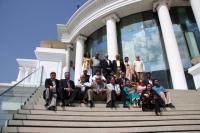Track II Dialogues
Chaophraya Dialogue 6: Joint Resolution on Track II Dialogue
Date: October 9, 2013
Islamabad 30th January: A group of senior opinion makers from India and Pakistan including retired ambassadors, foreign secretaries, intelligence chiefs, army chiefs, academics, political leaders and strategic policy journalists conducted a comprehensive two-day dialogue on a range of issues impacting the bilateral relationship. Terrorism, extremism, Jammu and Kashmir, nuclear stability, security, safety and crisis management were some of the issues discussed at the sixth round of the Chaophraya Dialogue in Bangkok, jointly organized by the Jinnah Institute, Islamabad and Institute of Peace and Conflict Studies, New Delhi.
Participants from Pakistan included Sherry Rehman, President Jinnah Institute, Amb (retd) Aziz Khan, General (retd.) Jehangir Karamat, Brig (retd.) Ambassador (retd.) Humayun Khan, Ambassador (retd.) Aziz Ahmad Khan, AVM (retd.) Shahzad Chaudhry, Nasim Zehra, Dr. Rifaat Hussain, Moeed Yusuf, Brig (retd.) Feroz Khan and Sehar Tariq of the Jinnah Institute. Participants from India included Professor Amitabh Mattoo, Maj. General (retd.) Dipankar Banerjee, Dr. Sanjaya Baru, A.S. Dulat, Sagarika Ghose, Dr. Happymon Jacob, Admiral (retd.) Raja Menon, Ambassador (retd.) Parthasarthy and Siddharth Vardarajan.
They agreed on the following joint declaration.
The absence of a formal and sustained engagement on the full range of issues confronting India and Pakistan is unhealthy, counterproductive and dangerous. We welcome the forthcoming meeting of foreign secretaries in Thimphu and hope that the two sides will be able to prepare the ground for the resumption of a comprehensive and sustained dialogue. We hope that this will lead to a productive summit.
We agree with the broad vision of India Pakistan relations in which borders cannot change but can indeed be made irrelevant.
We resolve that a dialogue between the two countries should include discussions on Jammu and Kashmir. The formal bilateral dialogue should be complemented by back-channel contacts. The people of J&K should be appropriately consulted in this process. We emphasize the need to prioritize the implementation of previously agreed upon CBMs, particularly on trade and travel.
We note with disappointment the difficulty in people to people contact because of the increasingly restrictive visa regime. We urge the two governments to adopt a more rational visa policy that facilitates contacts, particularly between media practioners, academics, students and business people.
We reiterate the need to initiate institutionalized and regular dialogue between the intelligence agencies of the two countries.
We acknowledge the increasingly crucial role of the media on both sides of the border in shaping public perception. Therefore, we encourage the media to help strengthen the constituency for peace in both countries. We exhort the opening up of the air waves to each other’s television channels and other cultural products.
We believe that South Asia is faced with serious challenges posed by extremism, which undermine democratic and pluralistic societies. There is a special need to ensure that state institutions are not eroded and undermined by extremism
Terrorism is of deep concern to both India and Pakistan. Indian concerns about the Mumbai attacks in 2008 have seriously affected the dialogue process. The perpetrators of the attack should be brought to justice at the earliest. Pakistan has deep concerns about the tragic loss of lives in the Samjhauta Express attack. India has to expeditiously prosecute those involved and keep Pakistan informed.
It is imperative that the continuous exchange of information on incidents of terrorism takes place.
We note with concern that China, India, and Pakistan are going against the global trend toward arms reduction and strategic build down. At the same time, it was noted that the region is endangered by the absence of robust crisis prevention and crisis management mechanisms.
We recommend that there should be uninterrupted and uninterruptable dialogue on issues of strategic stability. We endorse the idea of setting up of a bilateral study group for this purpose. This group should provide inputs into the policy formulation on these issues.
We believe that it is essential to review the efficacy of existing CBMs between the two countries and explore additional declaratory, unilateral, and mutually agreed Nuclear Confidence Building Measures and Nuclear Risk Reduction Measures.
We hope that India and Pakistan can work together to identify avenues for cooperation in the emerging nuclear and security architecture on the basis of non-discrimination.
We emphasize the need for a discussion between China, India and Pakistan to promote strategic stability with a focus on the logic of sufficiency of arsenals.

